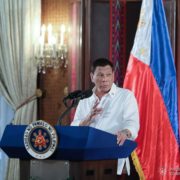Malacañang on Thursday, September 12, assured the public that President Rodrigo Duterte is not abandoning the 2016 arbitral court ruling after he revealed that China and the Philippines are looking into joint oil and gas exploration in the disputed West Philippine Sea (South China Sea).
The clarification comes after the president said both countries have agreed to a 60-40 sharing scheme in the sea in exchange for setting aside the arbitral ruling.
“Set aside your claim. Then allow everybody connected with the Chinese companies,” Duterte said Wednesday, September 11, quoting Chinese President Xi Jinping.
“They want to explore and if there is something, they said, ‘We would be gracious enough to give you 60 percent.’ They will only get 40 percent. That is the promise of Xi Jinping,” he added.
In a press briefing, Panelo clarified: “The setting aside doesn’t mean that we will abandon it. What the President means is that, as we have repeatedly said and as he has said, too, the arbitral ruling is still subject to talks between the two countries; negotiation is ongoing peacefully. But meanwhile, we focus without other concerns that may mutually benefit the two countries.”
“In other words, there is an impasse so let them talk; so let’s talk about other things like this joint exploration,” he added.
Former Foreign Affairs Chief Albert del Rosario noted that China’s move asking the Duterte administration to “set aside” the arbitral court ruling “can be viewed as significant recognition by Beijing of the arbitral outcome.”
Xi, at the bilateral meeting with Duterte in Beijing last month, refused to acknowledge the arbitral ruling that invalidated China’s nine-dash line claim in the South China Sea.
Del Rosario, who was part of the legal team that helped the country secure a favorable ruling from the UN-backed court based in The Hague, said, “In our desire to advance the rule of law, therefore, we should not allow our rightful position to be thrown into reverse gear.”
“We surely do not want the consequences of a nine-dash line to once again confront us,” he added.
Del Rosario also pointed out “that ‘to come up with an economic activity’ in our exclusive economic zone (EEZ) need not involve setting aside the Arbitral Ruling and running afoul of the Constitution.”
Panelo, for his part, slammed the former foreign affairs chief.
“He talks too much. We’ve already responded to all his opinions and he should look at himself in the mirror and admit that he’s the one responsible for losing Scarborough Shoal,” the spokesperson said.
According to Panelo, Duterte regards the arbitral ruling as permanent, binding, final and unappealable.
“It’s there forever and ever, like forever,” he said.
‘Disappointing, irresponsible’
Vice President Leni Robredo expressed her dismay over Duterte’s remarks that he would set aside the arbitral ruling to spur “economic activity” in the Philippines’ EEZ.
According to her, his declaration is “profoundly disappointing and extremely irresponsible.”
“It will affect the lives not just of our generation of Filipinos, but that of our children, and our children’s children. We must take great care in ensuring that we are not trading away the long-term interests of our nation and our children for short-term profit,” she said.
“Guaranteeing a better future for our children is perhaps one of the most important, and most difficult, responsibilities of any administration. Selling that future for a gas deal with China is a shameful way of abandoning that responsibility,” Robredo added.
The vice president pointed out that entering into an agreement “should not come at the expense of upholding our rights to the West Philippine Sea.”
“Our own Constitution already grants the State ample authority to enter into agreements with foreign entities for exploration and development of oil and gas resources, provided that these shall lead to ‘real contributions to the economic growth and general welfare of the country.’ Why, then, was this reckless pronouncement made?” she added.
Robredo also argued against Duterte’s statement that capitulation and conflict are the only choices available for the Philippine when it comes to dealing with the issue.
“I must point out that this is not true. Open warfare is far from the sole means of asserting our rights to our exclusive economic zone, as our neighboring nations Vietnam and Indonesia have recently and repeatedly proven,” she said.
“The strongest anchor to our claim must be consistency—in our official positions, in our negotiations, and in the statements of our top official,” she added.
Robredo stressed that a firm and consistent assertion of the country’s legal rights does not require a single shot being fired.
“Yet why do the President and his administration constantly fail at doing it? Why are the President and his administration the very ones who undermine our decisive victory before the arbitral tribunal in 2016 with remarks such as this?” she stated.







